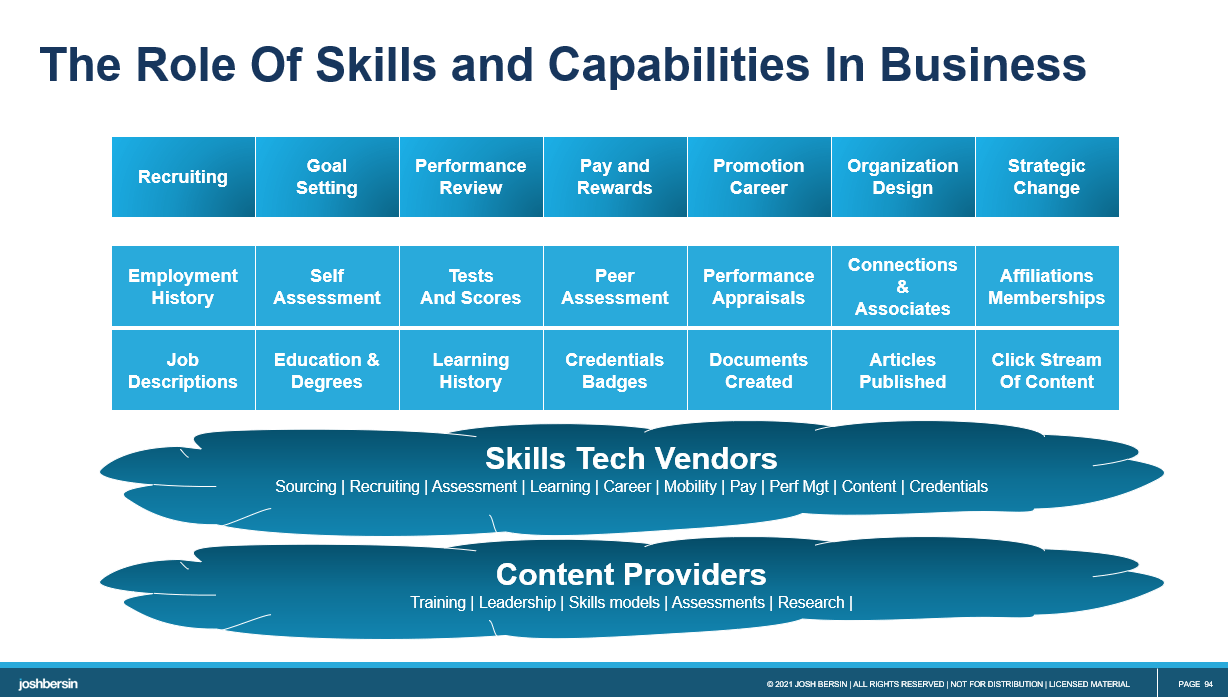Understanding SkillsTech, One Of The Biggest Markets In Business
One of the hottest markets in HR Tech is the market for what I call “SkillsTech,” tools that help categorize, assess, manage, and improve skills at work. It’s a massive space, and this week I produced a podcast to help you figure it out.
To clarify what this is all about, let me remind you that skills assessment and development are fundamental to every people practice in business. Who we hire, how we pay, who we promote, and how we organize our companies are all built on the fundamental building blocks of skills. And from a strategic perspective, as I talk about in the podcast, every time the CEO wants to go in a new direction, skills and capabilities are fundamental to execution.
At the risk of simplifying a big market, let me start with a simple picture. Virtually every decision we make about people is somehow based on skills. This means all the vendors in the market, from recruiting to learning to HCM platforms, need a skills-based architecture. And underneath this whole tapestry, companies want a single Skills Taxonomy.
 |
So as you look at all your HR tools and systems, it’s important to think about this picture. How, if at all, will “skills and capabilities” be integrated and consistent across everything you do?
Consider the example I discuss in the podcast: a company needs a strategic pivot as its customer markets change. Initially, you built a company focused on innovation and pioneering growth, but now you need integrated solutions and more “systems thinking” in the organization. How do you hire for these skills, assess these skills, and develop them across all your roles? And how do you select your Power Skills, the “soft skills” that define your company’s culture?
Or consider an energy company moving into solar and alternative sources? Or an automobile company moving into electric vehicles? Or a software company moving into blockchain? These are not just “technologies” to learn, but entire systems of new skills the company must develop.
Ericsson, for example, has built an entire Capability Academy focused on the ecosystem of 5G. Not only do engineers need to understand the technology, but product managers and sales teams need to understand the new 5G business applications, business models, and economy of solutions in the market.
And this is not as simple as buying an LXP or turning on the “skills cloud” from your HCM vendor. Yes these are important pieces, but you have to bring them all together to create the “skills infrastructure” in your company.
I won’t try to detail this space here (listen to the podcast), but let me leave you with this: we can stop talking about Why skills are important and now focus on How.
How do you organize your team to create an integrated capability model for the company? How do you stitch together your systems so a consistent skills taxonomy can be created? How do you build the governance and leadership focus so you can revisit your strategic skills every few years? How do you define and segment operational skills, strategic skills, and basic skills so people have a roadmap of where to go? How do you source new skills when the jobs they do are not even clearly defined? And how do you build and buy the right learning solutions (including internally) to continuously develop the skills you need?
Tech vendors are innovating faster than ever. Skills inference engines, taxonomy tools, and even blockchain verification solutions are coming. EdCast, for example, is now offering a SkillsCoin to help you quantify and reward skills in your company. There’s a lot more to come, and I encourage you to read our HR Technology 2021 report for more detail.
And if you’re interested in seeing how an integrated skills strategy works in HR, join our Global HR Capability Project. We are implementing an integrated capability solution for your own business function, and we’re happy to show you how it works.
SkillsTech is definitely here to stay. I encourage you to dig in, it’s becoming one of the most important solutions in business.


